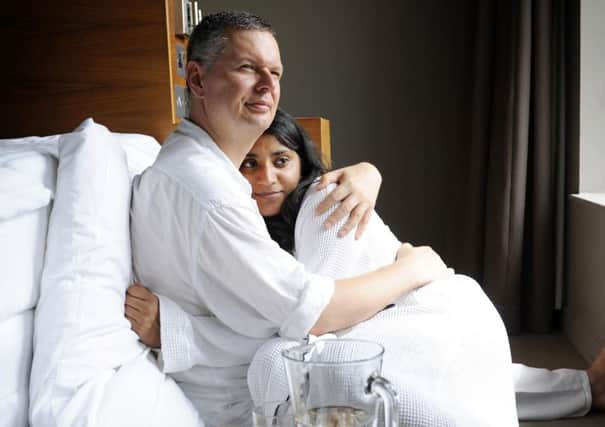Obituary of acclaimed theatre-maker Adrian Howells


BORN: 9 April, 1962, in Sittingbourne, Kent. Died: 16 March, 2014, in Glasgow, aged 51.
The grubby clothes that we had been asked to bring with us were soon whizzing around in the washing machine; and in no time, we found ourselves drawn into the most intimate conversation with our hostess, a character called Adrienne, a gorgeous, kindly, sharp-witted and hugely empathetic creature who soon had everyone in her kitchen divulging secrets, some of which had never been told before.
Advertisement
Hide AdAdvertisement
Hide AdAs a first encounter with the life and work of Adrian Howells, who has been found dead in his Glasgow flat at the age of 51, it was an unforgettable experience, challenging and penetrating all the emotional barriers with which 21st-century men and women often surround themselves, in order to cope with busy and competitive lives.
Over the next 12 years – first in the character of his female alter-ego Adrienne, and then increasingly as Adrian – Howells went on to develop an extraordinary series of performances, each of which involved an unusually intense interaction with his audience, and a profound challenge to their ideas of self-sufficiency and invulnerability; and the international acclaim he won as a performer formed the basis for his increasingly influential work as a teacher of theatre and performance, in Glasgow, and at universities from Bristol to Singapore.
Adrian Howells was born in Sittingbourne, Kent in 1962, to a father who worked for Marks & Spencer, and mother who loved literature and amateur drama, and passed those enthusiasms on to Adrian.
At Borden Grammar School in the 1970s, Adrian often found himself slightly at odds with a school culture strongly focused towards science, technology and sport, but he was the star of many school shows, and shone in drama and English.
In 1980, he left home to study drama at Bretton Hall, part of Leeds University, graduating in 1984; and for the next six years, he worked as an actor, building up a fund of hilarious stories about his experiences in panto across England.
In 1990, though, his mentor Ian McKellen suggested that he might find more interesting work at the Citizens’ Theatre in Glasgow, where the legendary Philip Prowse offered him a job as an assistant director; and from that moment, Glasgow became Howells’ creative home.
He spent a decade working in and around the Citizens’, appearing as an actor in productions that ranged from a mainstage version of Romeo And Juliet to the first-ever project of Stewart Laing’s Untitled Projects company, Myths of the Near Future, at Govan Baths in 1998.
Then in 2000, while playing the drag queen in Laing’s Citizens’ production of Mae West’s The Pleasure Man, he met the London-based choreographer Linda Dobell. She gave him an open commission to entertain audiences at a performance event she was curating at a London gallery; and as Howells approached his 40th birthday, the character of Adrienne emerged, opening the way to his ground-breaking 12-year career as an exploratory solo performer.
Advertisement
Hide AdAdvertisement
Hide AdSome of the shows Howells created over those years – like his Audience With Adrienne, which travelled from Glasgow and Edinburgh to London, Israel and Singapore between 2006 and 2009 – involved a group audience of a dozen or more.
Many others, including his 2008 masterpiece Foot Washing For The Sole, about the tradition of foot-washing across many religious traditions, consisted of a one-to-one encounter between Adrian and a single audience member, who might find him or herself being washed, held, wrapped, or danced with, and always encouraged to open up to the sensual and caring aspects of life to which we often give such short shrift.
All of Adrian Howells’ shows, though, were beautifully crafted around this element of audience interaction; all of them raised profound questions about the limitations of the way we live now.
And they inspired what became, over the last decade of Adrian Howells’ life, a hugely significant teaching career.
From 2006 to 2009, he was an Arts and Humanities Research Council fellow in the Department of Theatre, Film and Television Studies at the University of Glasgow, helping to develop a generation of new theatre makers; and through his connections with the Arches Theatre, Tramway, the Citizens’ and the National Theatre of Scotland – for which he created his Lifeguard project at Govanhill Baths in 2013 – dozens if not hundreds of artists across Scotland and beyond were touched by his rare combination of sharp intelligence, sheer creative courage, and boundless emotional generosity. Since Adrian Howell’s death was announced, earlier this week, tributes have poured in, from fellow artists, from those he taught and mentored, and from those who experienced his work. Adrian’s vulnerability to savage episodes of depression was well known to all those who loved him and worked with him.
Yet friends and colleagues always experienced him as one of the most witty, beautiful and vibrant people they had ever met; his Glasgow flatmate, the writer, performer and singer Judith Williams, says that he was a wonderful, loving, and very tidy housemate, with a tremendous intimacy, honesty and generosity that he offered unstintingly to others, although not always to himself.
Adrian is survived by his parents, by his brother Julien, and by thousands of friends, colleagues and students across the world of theatre, who will never forget his inspiration, his voice, or his touch. And Battersea Arts Centre, another of his favourite venues, seemed to speak for all of them with this farewell message, posted on Tuesday:
“Adrian Howells, who graced this old town hall with his warmth, gentleness and vision. He taught us about theatre, care, love, regret and hope. May he rest in peace.”